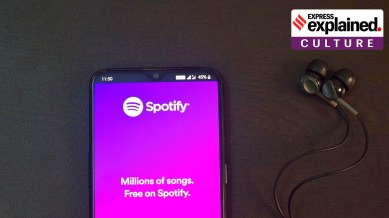Why are so many musicians removing their music from Spotify?
Besides issues of compensation and streaming monopoly, some musicians don’t want their music to ‘kill people.’

Last week, Canadian post-punk band Godspeed You! Black Emperor pulled its music from all streaming services, including Spotify.
The band joined a slew of others, including American outfits Deerhoof and Xiu Xiu, Australian rock band King Gizzard & the Lizard Wizard, Netherlands-based label Kalahari Cult Music and Australian contemporary musician and songwriter David Bridie, who have all withdrawn their music from Spotify in the last two months.
monthly limit of free stories.
with an Express account.
Australia-based folk singer Leah Senior joined the artists on July 1, while Melbourne synth-punk band Dr Sure’s Unusual Practice announced that their new record would not be on Spotify.
Why are the artists leaving?
Issues such as the rising monopoly of streaming services in the music market, proliferation of AI-generated music, and the meagre pay that artists receive from streaming companies for each time that a listener plays a song have been debated among musicians of late. This time, however, Spotify CEO Daniel Ek’s 600 million euros investment in AI-driven weapons technology is the centre of attention.
Several musicians are concerned about Ek making military investments through his investment fund, Prima Materia, into a German start-up. The Munich-based company, Helsing, is a defence tech startup that deals with real-time AI warfare and armed interventions through AI software.
The investment comes amid massive geopolitical instability in the wake of the Russia-Ukraine war and the Israel-Palestine conflict. Ek, who hails from Sweden and is also the Chairman of Helsing, told The Financial Times that Helsing’s tech will ensure there is “strategic autonomy” and “security readiness” for Europe.
How have artists reacted?
The Spotify boycott began soon after. While two-decade-old California-based Xiu Xiu, known for its avant-noise sound, called Spotify a “garbage hole armageddon portal”, members of Deerhoof put out a statement that said, “…We don’t want our music killing people. We don’t want our success being tied to AI battle tech”.
Kalahari Oyster Cult Label wrote that they did not want their music “contributing to or benefiting a platform led by someone backing tools of war, surveillance, and violence”, and Bridie said “…here we are, artists helping to build algorithms to sell our music – and the success of that algorithm determines the flow of wealth to a man who invests in building machines that could kill people”.
Bridie wrote in The Guardian, “In recent years, we’ve witnessed the horror of AI drone wars in Ukraine and Gaza – children killed and hospitals destroyed with the press of the space bar. Ek is investing in technology that can cause suffering and death. Spotify used to seem like a necessary evil. By association, it now just seems evil.”
He also spoke about the company paying artists between $0.003 and $0.005 per stream and how it was “insulting and completely unsustainable”.
Godspeed You! King Emperor, in their 2024 album ‘No Title As of 13 February 2024, 28,340 Dead’ had highlighted the casualties in war-ravaged Gaza, questioning the relentlessness of pain and death.
Have there been other occasions when artists have left Spotify?
Yes. In 2022, Grammy-winning rockstar Neil Young, who has an extensive five-decade oeuvre, removed his music from Spotify after he accused podcaster Joe Rogan of spreading Covid-19 misinformation. Rogan, one of the biggest figures in podcasting today and one of Spotify’s biggest draws, had invited far-right guests who questioned vaccines and pandemic restrictions.
Young had asked Spotify to choose between him and Rogan, and Spotify chose the latter, even after 300 scientists wrote to the streaming service to stop spreading misinformation. The World Health Organisation (WHO) also backed Young.
He was followed by noted singer-songwriter Joni Mitchell, who also removed her music. Nils Lofgren, the guitarist of Bruce Springsteen’s E Street band, followed suit. Young and Mitchell returned to Spotify in 2024 after Rogan’s podcast expanded to Apple Music, YouTube and Amazon Music. The two were concerned about how listeners would stream their music if all platforms began hosting Rogan, and the entire episode displayed the dominance that streaming companies enjoy today.
In 2014, when guitarist and singer Thom Yorke of the famed English rock band Radiohead decided to take down his music from Spotify because he felt that artists were not being paid enough, it created quite a flutter in the global music industry. The same year, pop icon Taylor Swift also pulled her music, equating music with art and raising issues of streaming royalties. She returned in 2017, around the time that a sharp increase was reported in annual payments from platforms to the industry.
Has Spotify made any effort to address these concerns?
Spotify upgraded its royalty system in 2017 and launched an annual reporting system named the ‘Loud and Clear’ initiative in 2021 for more transparency. It emphasised that the company pays labels, publishers and aggregators, but not the artists. Direct payments were a key demand of musicians.
It has also tried to address other issues. It introduced new rules for people trying to game the system by releasing a large amount of music, and introduced a 1,000 minimum plays rule before a song was awarded royalties. It also targeted short ‘noise’ tracks under 30 seconds, created specifically to generate royalties. The minimum length was increased to two minutes.
Spotify has lately claimed to work towards detecting AI-made music. However, it has not addressed the recent controversy around Ek’s investment so far. The divide between artistic values and strategic moves of one of the biggest streaming platforms continues to rise as a result. “I’m sure people will criticise it and that’s okay. Personally, I’m not concerned about it. I focus more on doing what I think is right and I am 100 per cent convinced that this is the right thing for Europe,” Ek told The FT.